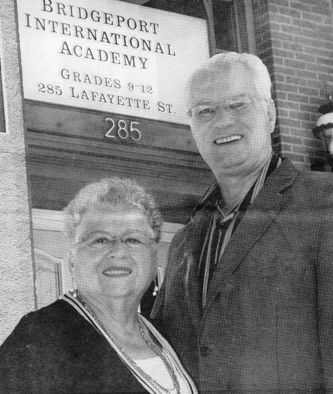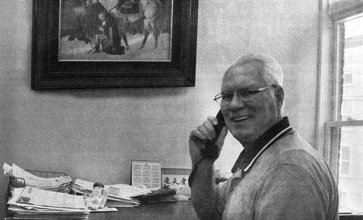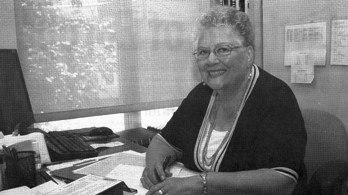![]()
The Words of the Spurgin Family
|
|
The Words of the Spurgin Family |

Hugh and Nora Spurgin are the headmasters of Bridgeport International Academy.
Question: As headmasters of Bridgeport International Academy, a school with an extremely diverse student body, you have built a school that is a microcosm of our Founder's vision of a multicultural world of peace. How do you see this high school contributing to the goal of an ideal world of peace and global cooperation? You have invested the past 15 years of your church life into establishing this school (which received NEASC accreditation in 2006). Do you see it carrying on without you once you've retired, if, indeed, you are going to retire?
Hugh Spurgin: Retirement is not really a word in our vocabulary. I heard the word "re-firement" recently and I really could relate to that! When Reverend Moon came to visit the school, he created the motto "The decisions made in youth determine the flowering in one's adult life" (translated from Chinese characters). The teenage years are critical and the choices they make affect their entire life. Working with young people not only keeps us young, but it keeps us on the forefront -- on the cutting edge -- of what is happening both inside and outside of our church. We feel it's where we can make the most difference. Many people say they are fearful of working with teenagers, that they are difficult, etc., but that's not how we see it. We receive great joy and satisfaction from seeing youth growing, developing, and changing.
Nora Spurgin: I often think of how these students from various countries and backgrounds may be leaders in the future. They may even meet with each other and work together to solve global problems, to build businesses or at least they will be working with people from different backgrounds applying what they learned here at BIA. It's exciting and rewarding to see students' growth and potential and to ponder the future difference that they will make in the world. It's also a place where our church youth can study in an environment that is free of many of the social pressures so prevalent in public schools.
Question: Okay, let's go back to the time when you joined the church (which was called the Unified Family in the late 60s). As two of the earliest members in America you must have felt a heavy sense of responsibility. The unique vision of Reverend Moon to restore the entire world back to God must not have seemed like an easy task especially with so few people to accomplish it! Can you describe what the church was like when you joined and what your feelings were at that time?
Nora Spurgin: I was very moved by the Divine Principle. However, for me, the most difficult part was that the mission of the Messiah was to be fulfilled by someone else (not by Jesus but by True Father). I prayed about this for a long time. All the rest of the teaching felt so true to me, and I realized that no matter the cost I had a responsibility like the early disciples to follow. I felt that my dedication and total commitment was what the Providence required at that time.
I was raised as a Mennonite. I was actually what they call a "charismatic" Mennonite, which means to some extent I was open to new possibilities. Nevertheless, I was a fulfilled Christian. I did, however, feel an indefinable feeling that "there is always more." Deciding to join the church was a very difficult decision that I wrestled with for a period of time, but I knew that once I made the decision that would be "it." I wasn't just trying it out; God was calling me and I had to "let go and let God," as they say.
Hugh Spurgin: There are many reasons people joined our church: some joined because of spiritual experiences, some were attracted to the sense of community, and others to Reverend Moon, himself, through one of his speeches. When I joined, Reverend Moon was not even in America (although he had visited once in 1968). I joined because of the teaching or worldview. I am inquisitive and a seeker. I grew up in a Presbyterian home; however, we were not overly religious. I arrived in Washington, D.C. only 30 days prior to meeting the movement. I was actually in a library researching the Baha'i faith and when I left the library, someone came running down the street after me with a flyer. I immediately went to the church center and heard the Divine Principle lecture series.
It answered many questions for me but there was one in particular that had always haunted me: Why do people suffer? Why do some suffer cancer, or early death, or other tragedies, while others don't?
....A baby dies young, there is a natural disaster in one area, there are the rich and there are the poor. I understood when I heard Chapter 2 (The Fall of Man, chapter 2 of the Divine Principle text) the realities of evil, why and how it exists. Additionally, I am an intellectual and was attracted to the historical truth. It never made sense to me that Jesus would come to die. As the Divine Principle explains, he came to realize God's Will as the perfected Adam but people were not prepared to receive him. That made sense. Therefore, it logically followed that he must come again as a man in the human flesh.

Question: How did you feel upon your marriage blessing in 1970? (The Spurgins participated in the Unification Church 777 Couples Holy Marriage Blessing Ceremony in Korea and were one of only seven American couples).
Hugh Spurgin: We felt tremendous gratitude and privilege. We were happy. The Messiah was on earth and together we were building the Kingdom of Heaven on Earth.
Question: Which brings us to how long this is taking -- building the Kingdom of Heaven on Earth! (Laughter)
Hugh Spurgin: Well, I'm an optimist. If we had known how long, and how hard it would be, how many conditions (sacrifices) had to be met, well, I would still have done it because I understood the ultimate worldview as outlined by the Divine Principle. Although through the process it was, sometimes, very hard for members to keep connected to the vision.
Nora Spurgin: When I joined the church I had been interested in the thought of Teilhard de Chardin (the French philosopher who wrote a groundbreaking work entitled The Phenomenon of Man), so I understood and already felt that we were, as a world, moving forward to a time when everyone was becoming part of God's family, one family. And no, we certainly didn't understand in 1972 that we would still be chipping away at the providential goals in 2012. In that sense, True Father protected us and led us every step of the way, pushing us, encouraging us and loving us (yes, and sometimes chastising us).
Question: As most older members know -- and a lot of our young members may not be aware of -- our church experienced a great deal of persecution in the 1970s and 80s. We were maligned in the press, investigated by the United States government under the misguided platform of Congressman Frazier. Many of our members in the 70s were kidnapped by deprogrammers acting on behalf of alarmed parents. In 1973 the press coined the word "Moonie," much to the chagrin of members, and the Unification Church was subsequently referred to over and over again as a "cult." All of this culminated in Reverend Moon's incarceration in Danbury Prison in 1984. It took a lot of sacrifice and hard work to lay a foundation for the establishment of a new religion. How did you weather the storms of that era? What kept you going during this onslaught of persecution, misunderstanding, and failure, which, given that there is so much idealism expressed in the church's teaching, must have tasted like an extremely bitter pill?
Nora Spurgin: I always sought to find a reason for my offering. When certain things were asked of me, I would consciously choose to make it an offering. In other words, I chose to "choose" this course. In that sense I never felt victimized or felt resentment when difficult situations arose because I took ownership along the way.
Hugh Spurgin: I was not so affected because I was and am a strong- willed person. I was very goal oriented and that kept me going. Also, we had a wonderful leader in Ms. Young Oon Kim (one of the first Unification Church pioneers to America). She was honest and transparent about the problems in the church and outside of the church. She didn't sugar coat anything. She had an open relationship not only with Reverend Moon but with us the members. We were able to trust her; she demonstrated incredible personal integrity in all situations. We were very fortunate to work and live with her in the early days of our movement. We were like a family.

Question: Our movement has been through many changes -- from its metamorphous as a center-based church with a small membership to a global community with businesses around the world. Change in any organization can be hard to adapt to and members often find themselves having to re-invent the way they live, survive and/or balance family and church life. How does a person hold steadfast to their core beliefs when confronted by tumultuous change both within and without of the church?
Hugh Spurgin: Well, I like change! (Laughing) I like reacting to change. Change is normal. It provides us with opportunities to do new and exciting things.
Nora Spurgin: I am often reminded of the quote, "Your/God is too small." We do not 'always see the big picture and yet we can always make space for the bigger picture -- for change to occur and broaden us.
Reverend Moon always said that he was not here to build another church, another denomination. He had a much larger vision of what he was here to accomplish.
If the institution of the church breaks down, it seems threatening to some members when in fact if you connect to Father's vision, what happens inside the Unification Church is not so threatening. Our church work is merely a stepping stone to a greater purpose.
Hugh Spurgin: True Parents are the "radical center". In many organizations the status quo is at the center. We are the opposite. Reverend Moon takes bold action and makes major change beyond what we conceive. For myself, I tried to guess or surmise what he might do next. I was always wrong. He was so bold but he himself is an agent of change. So, we live in a dynamic movement that's always in a state of flux. It keeps life interesting!
Question: A final question: Reverend Moon has prophesied about many world events such as the breakdown of the Soviet Union. In 1984 his constant refrain "We are going to Moscow!" was repeated to a skeptical membership who were old enough to remember, all too well, the Cold War years. Now, Reverend Moon is proclaiming that 2013 will be the beginning of "Cheon Il Guk" -- a time when a world of peace centered on God will absolutely come into existence and blossom for all eternity. Once again church membership is scratching their collective heads and whispering. How is it possible? My final question is: in the wake of a year of devastating earthquakes, tsunamis, tornadoes and war, how do you reconcile present-day reality with what Reverend Moon is now proclaiming?
Hugh Spurgin: The Divine Principle explains it and has always explained it. We believe we are moving steadily toward the Kingdom of Heaven on Earth and the world's problems, including natural disasters, are the birth pains of the emergence of Cheon Il Guk.